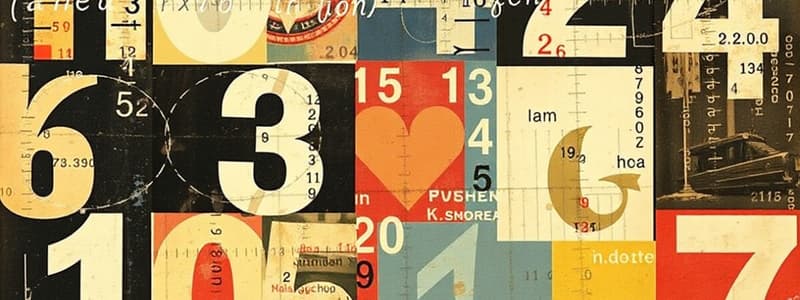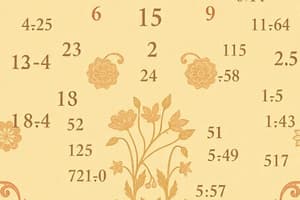Podcast
Questions and Answers
Which statement about whole numbers is true?
Which statement about whole numbers is true?
What happens when you divide a whole number by zero?
What happens when you divide a whole number by zero?
Which of the following statements regarding multiplication is correct?
Which of the following statements regarding multiplication is correct?
What does the associative property of multiplication imply?
What does the associative property of multiplication imply?
Signup and view all the answers
Which result is true when dividing zero by any non-zero whole number?
Which result is true when dividing zero by any non-zero whole number?
Signup and view all the answers
What is the identity element for multiplication among whole numbers?
What is the identity element for multiplication among whole numbers?
Signup and view all the answers
If 10 is divided by 3, what is the quotient and remainder?
If 10 is divided by 3, what is the quotient and remainder?
Signup and view all the answers
Flashcards
Whole numbers
Whole numbers
Non-negative integers, including zero and positive numbers (1, 2, 3, etc.).
Multiplication
Multiplication
Repeated addition of a number.
Commutative Property
Commutative Property
Order doesn't matter in multiplication (3 x 4 = 4 x 3).
Associative Property
Associative Property
Signup and view all the flashcards
Division
Division
Signup and view all the flashcards
Division by zero
Division by zero
Signup and view all the flashcards
Zero multiplied by any number
Zero multiplied by any number
Signup and view all the flashcards
Division properties (zero)
Division properties (zero)
Signup and view all the flashcards
Study Notes
Whole Numbers
- Whole numbers are the non-negative integers.
- They include zero and all positive integers (1, 2, 3, ...).
- They are used for counting and measuring discrete quantities.
- Whole numbers are closed under addition and multiplication.
- They are not closed under subtraction or division.
- The set of whole numbers is denoted by W.
- W = {0, 1, 2, 3, ...}
Multiplication
- Multiplication is a mathematical operation that represents repeated addition.
- It is denoted by the symbol "×" or "*".
- For example, 3 × 4 = 3 + 3 + 3 + 3 = 12.
- Multiplication is commutative. This means that the order of the factors does not affect the product. (e.g., 3 × 4 = 4 × 3)
- Multiplication is associative. This means that the grouping of the factors does not affect the product. (e.g., (2 × 3) × 4 = 2 × (3 × 4))
- Multiplication is distributive over addition. This means that multiplying a sum by a number is the same as multiplying each addend by the number and then adding the products. (e.g., 2 × (3 + 4) = (2 × 3) + (2 × 4))
- Any number multiplied by zero equals zero.
- Any number multiplied by one equals itself.
Division
- Division is the inverse operation of multiplication.
- It is denoted by the symbol "÷" or "/".
- Division can be thought of as partitioning a quantity into equal parts.
- For example, 12 ÷ 3 = 4 because 3 × 4 = 12.
- Division by zero is undefined. This is a crucial property to remember.
- Division has a quotient and a remainder.
- Example: 10 ÷ 3 = 3 remainder 1
- Dividing a number by itself (except zero) results in one.
- Dividing zero by a non-zero number results in zero.
Properties of Multiplication and Division
- The product of two whole numbers is always a whole number.
- The quotient of two whole numbers is not always a whole number. In some cases, division will result in a whole number (and no remainder), and in others, there will be a non-zero remainder.
- Zero multiplied by any whole number is zero.
- Zero divided by any non-zero whole number is zero.
- One multiplied by any whole number is the whole number itself.
- A whole number divided by one is the whole number itself.
- The identity element for multiplication is 1.
- The identity element for division, when applicable, is 1.
Studying That Suits You
Use AI to generate personalized quizzes and flashcards to suit your learning preferences.
Description
This quiz covers the concepts of whole numbers and multiplication, including their properties and operations. Understand how whole numbers function in mathematical operations and explore the fundamentals of multiplication. Perfect for students learning basic mathematics.




